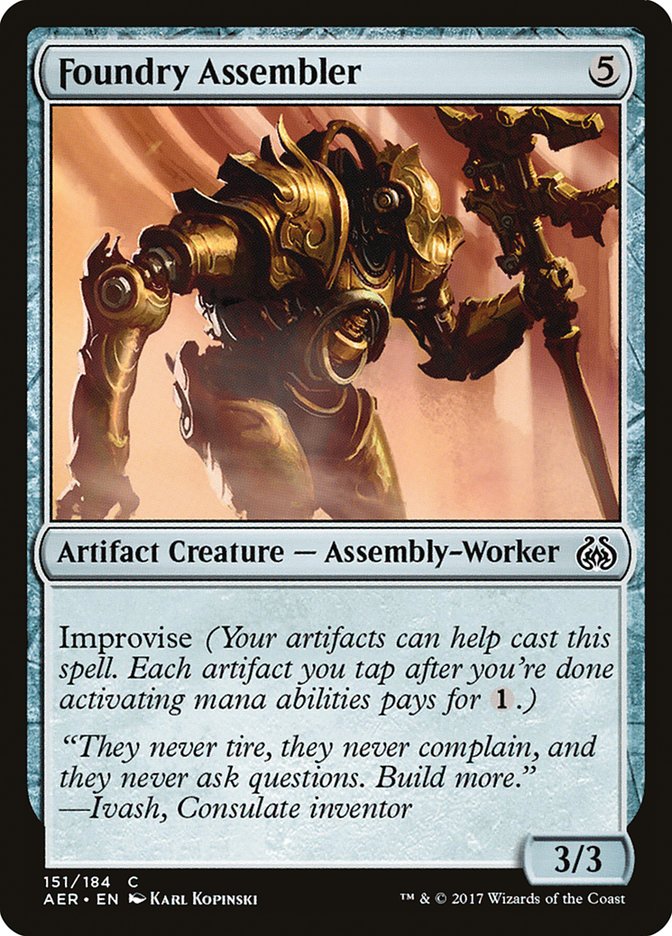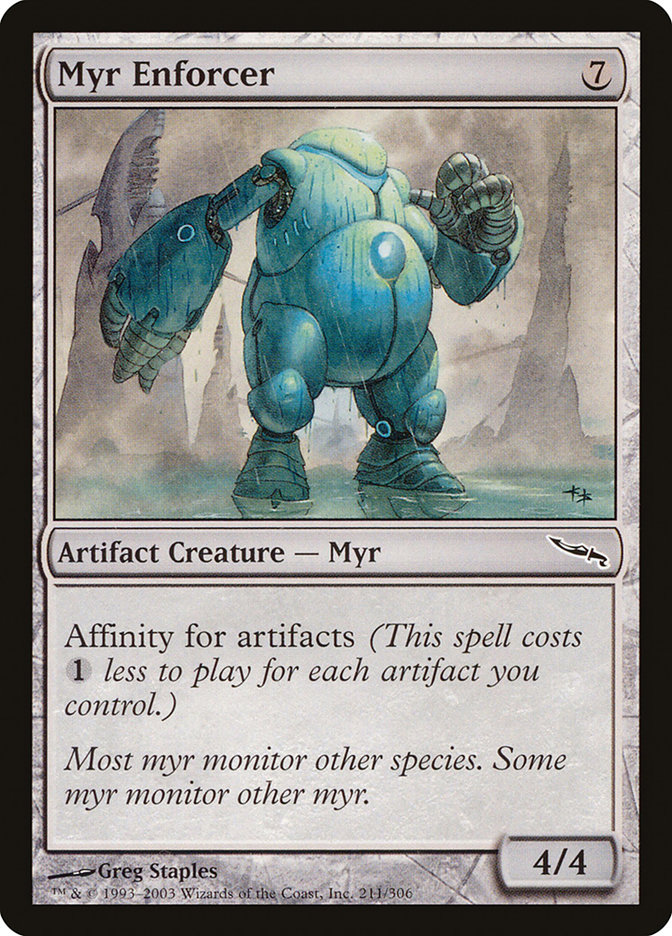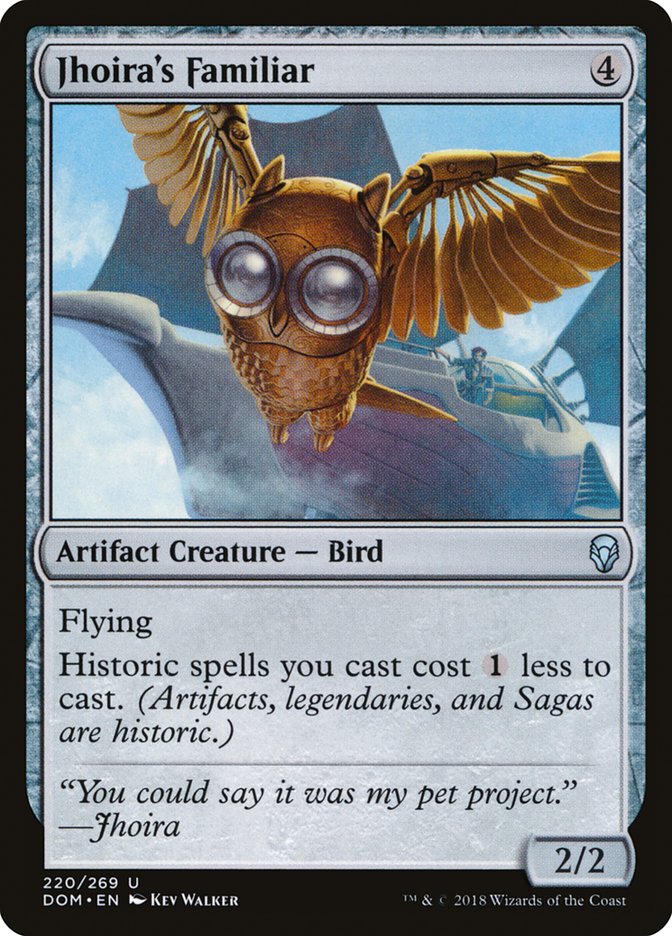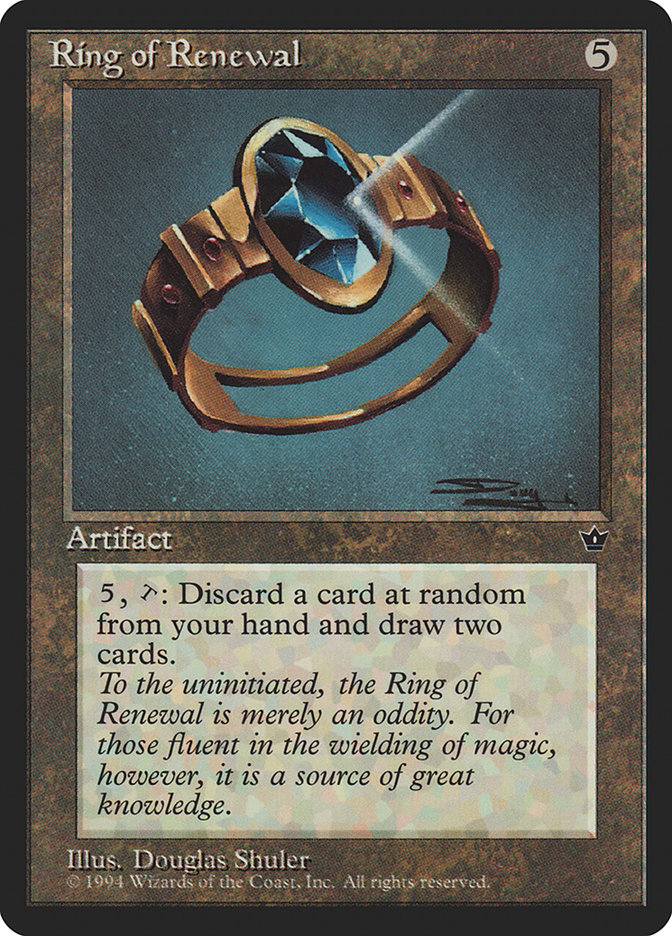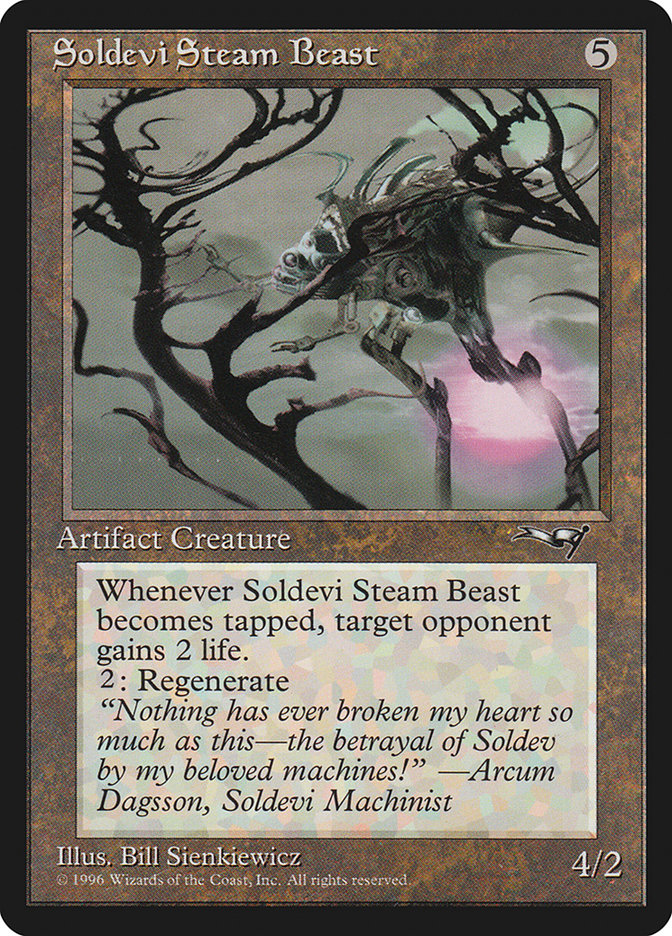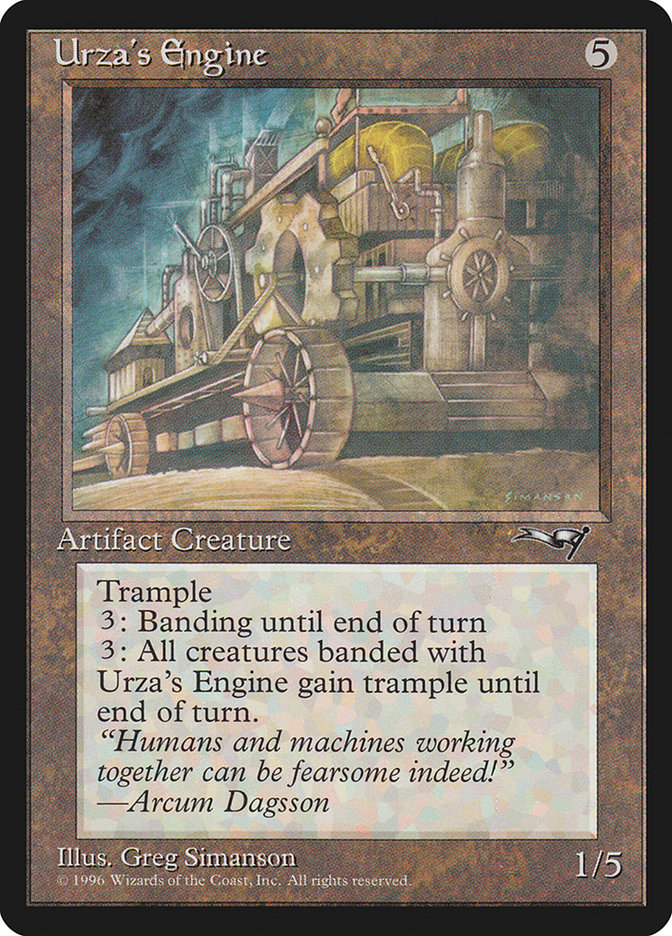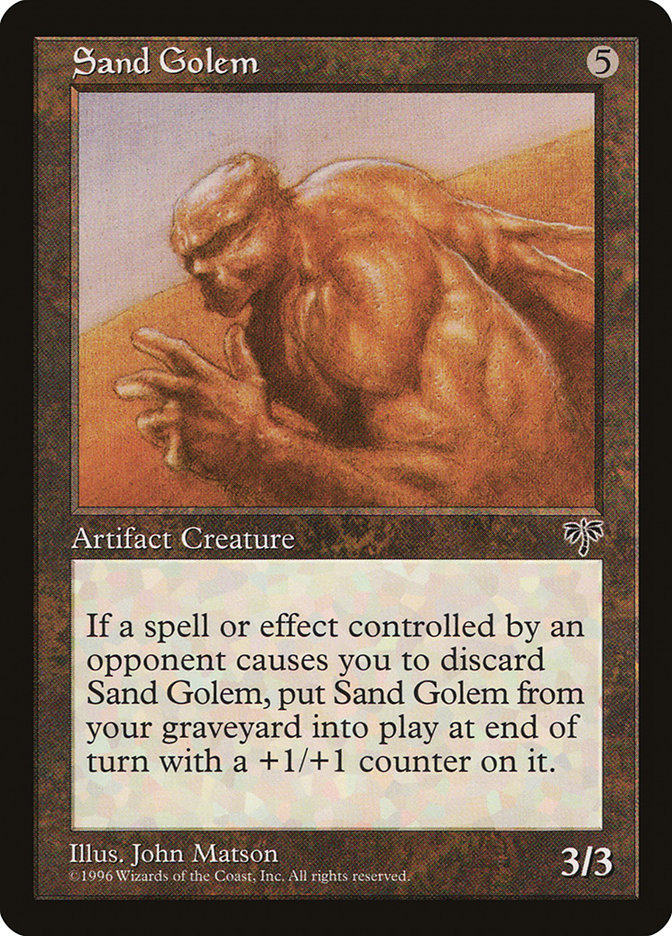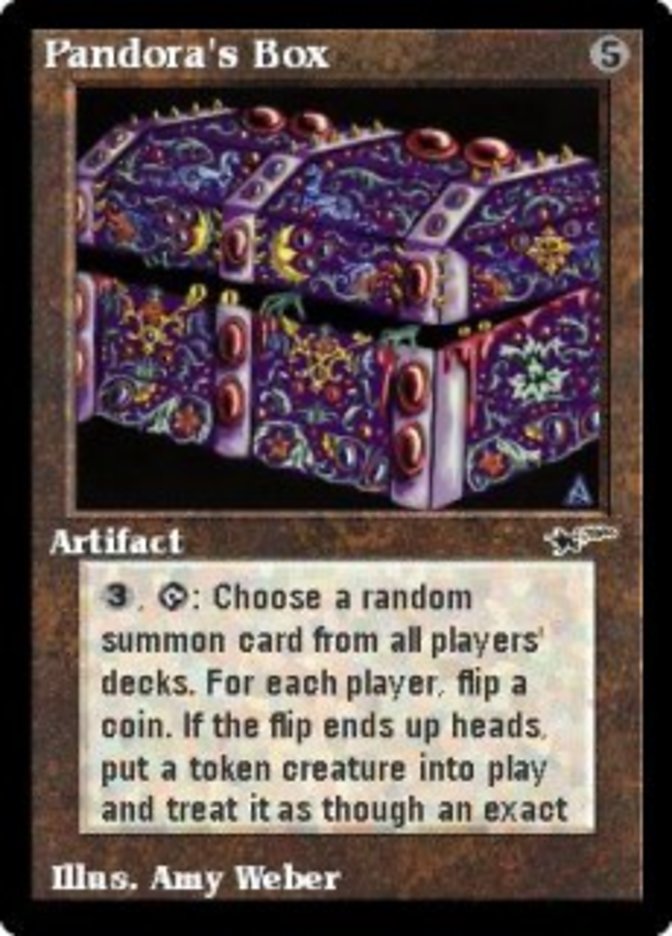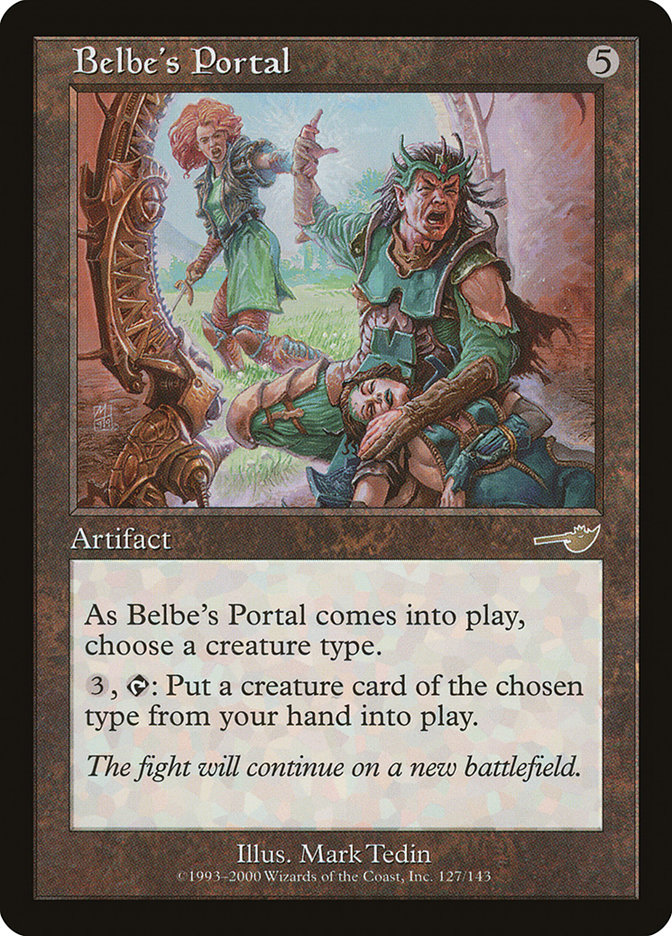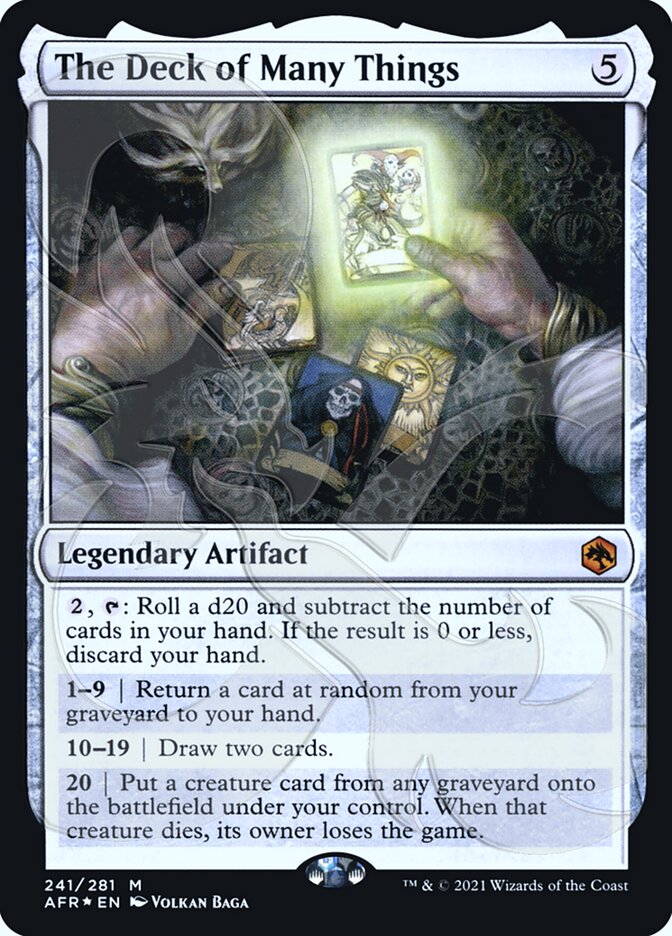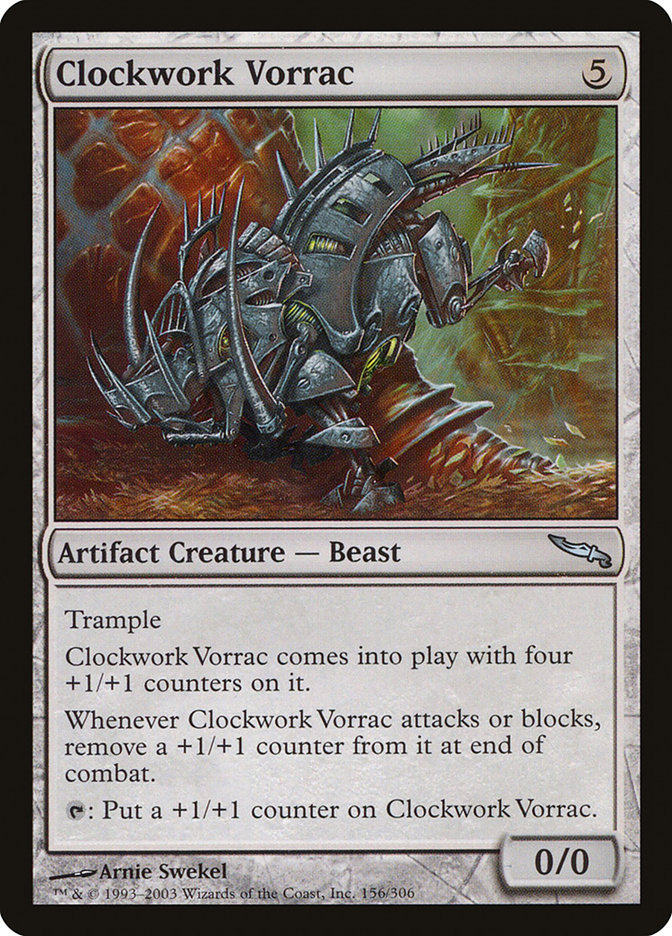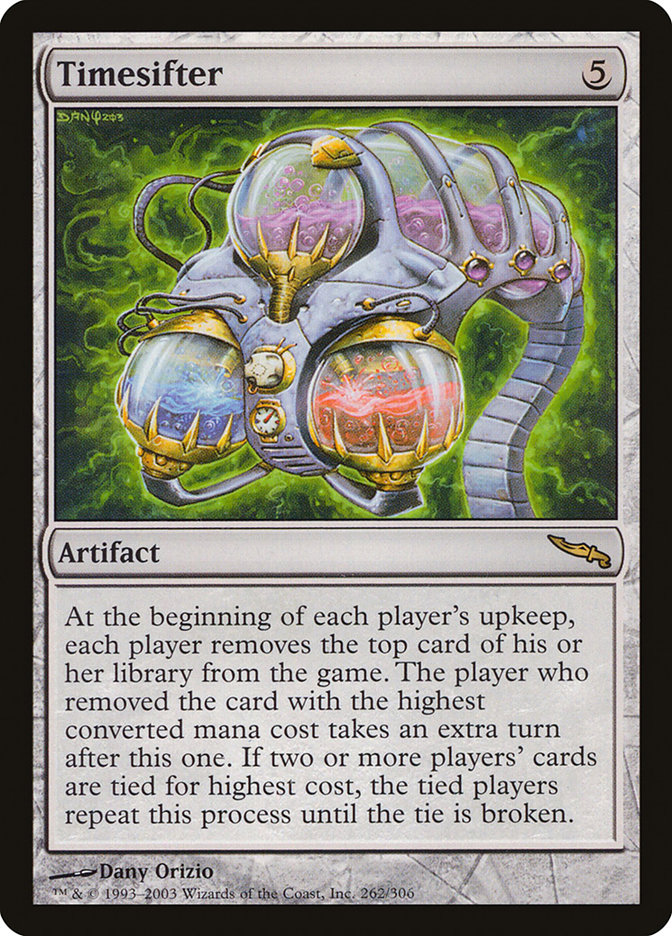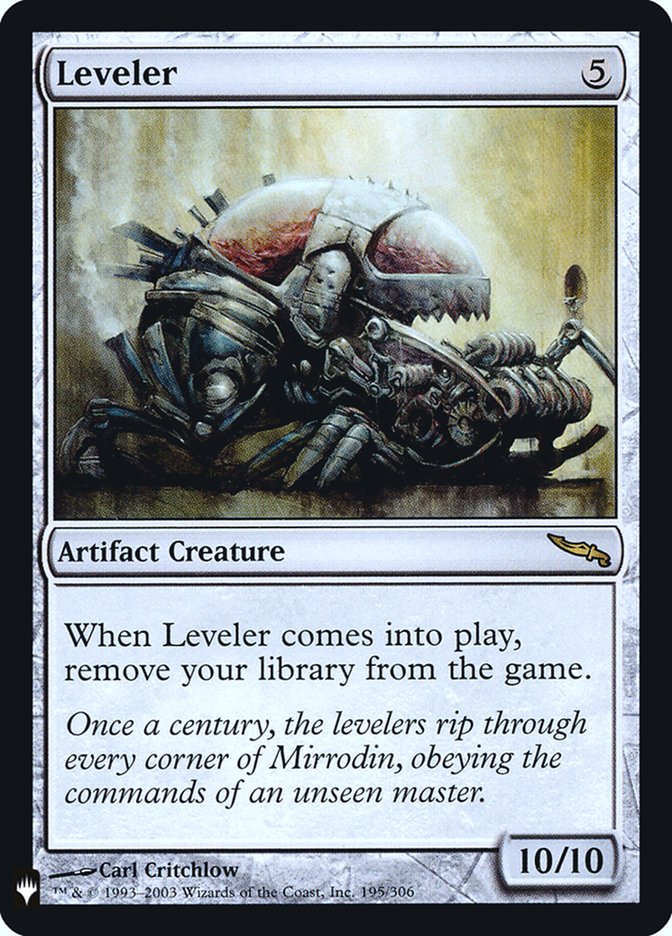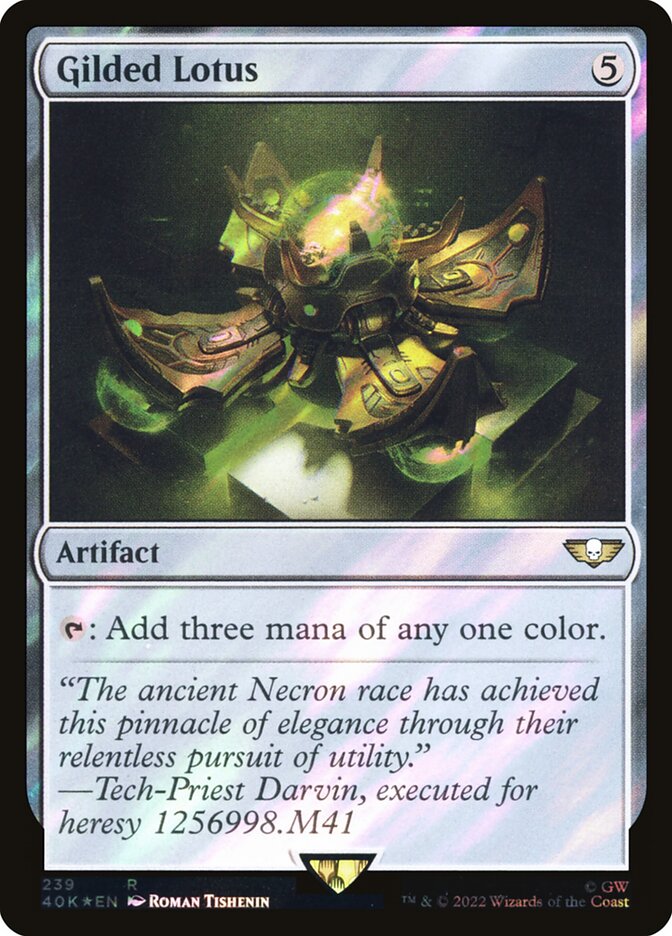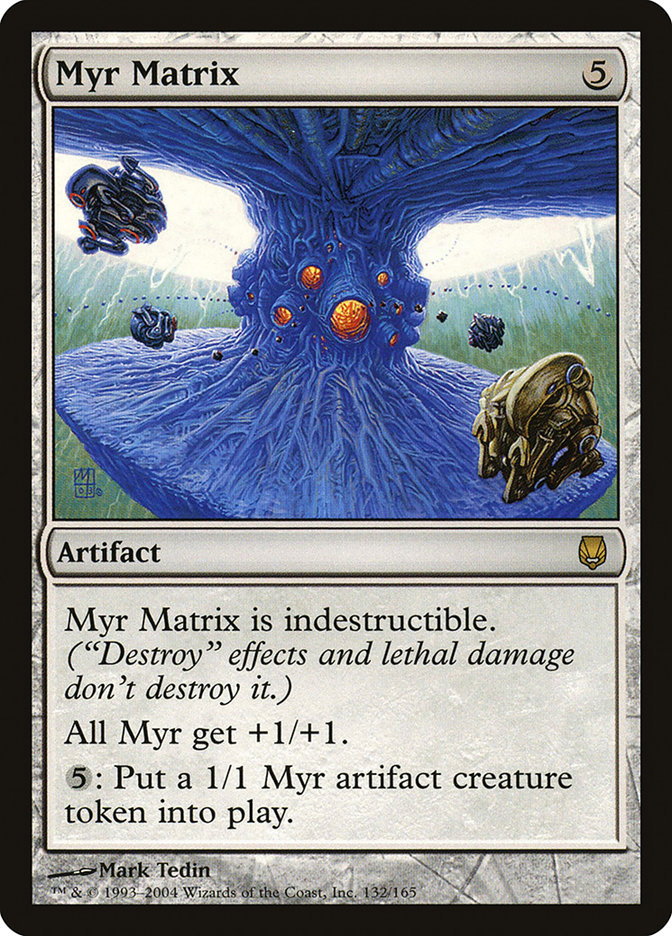Foundry Assembler MTG Card
| Mana cost | |
| Converted mana cost | 5 |
| Rarity | Common |
| Type | Artifact Creature — Assembly-Worker |
| Abilities | Improvise |
| Released | 2017-01-20 |
| Set symbol | |
| Set name | Aether Revolt |
| Set code | AER |
| Power | 3 |
| Toughness | 3 |
| Number | 151 |
| Frame | 2015 |
| Layout | Normal |
| Border | Black |
| Illustred by | Karl Kopinski |
Text of card
Improvise (Your artifacts can help cast this spell. Each artifact you tap after you're done activating mana abilities pays for .)
"They never tire, they never complain, and they never ask questions. Build more." —Ivash, Consulate inventor
Cards like Foundry Assembler
Foundry Assembler is an artifact creature that slots well into artifact-focused decks in Magic: The Gathering. A notable comparison is with Myr Enforcer, another artifact creature that can potentially be played for a low cost in a deck with numerous artifacts. While Myr Enforcer can sometimes hit the battlefield sooner due to its affinity for artifacts, Foundry Assembler benefits from the improvise mechanic, allowing you to tap unused artifacts each turn to lessen its casting cost.
Moving forward, Jhoira’s Familiar is also akin to Foundry Assembler in that it facilitates the casting of other artifacts. However, Jhoira’s Familiar offers a consistent mana reduction for historic spells rather than a one-time cost reduction like Foundry Assembler’s improvise ability. It’s worth assessing how frequently you can take advantage of either creature’s benefits depending on your deck’s strategy.
In summary, Foundry Assembler holds its ground among artifact creatures in Magic: The Gathering, bringing both a sizable presence on the board and a potentially reduced cost, making it a versatile inclusion in artifact-centric playstyles.
Cards similar to Foundry Assembler by color, type and mana cost
Card Pros
Card Advantage: Foundry Assembler can potentially enable card advantage in artifact-centric decks. With its ability to come into play with reduced cost due to its improvise mechanic, you effectively preserve cards in hand by tapping unused artifacts you control instead of spending additional cards from your hand to cast it.
Resource Acceleration: While Foundry Assembler itself is not a direct source of resource acceleration, it synergizes well within environments that utilize artifact resources. Its presence strengthens board state, and in combination with other artifacts, can accelerate your game plan by reducing casting costs of subsequent spells, effectively giving you a faster path to deploy your hand.
Instant Speed: Despite being a creature, Foundry Assembler complements instant speed strategies. Decks that operate at instant speed benefit from the Assembler’s ability to be cast potentially at a reduced cost during the end of the opponent’s turn, making use of artifacts that would otherwise remain idle. This allows for efficient mana usage while keeping up the pace and pressure, especially if you’re running a strategy that wants to maximise the use of mana and artifacts during each cycle of turns.
Card Cons
Discard Requirement: Diving into the inner workings of Foundry Assembler, players might find themselves at a disadvantage due to the card’s requirement for discarding as part of its ability. This cost sometimes poses a challenge, especially when your hand is dwindling or full of crucial spells and resources you’d rather hold onto for later stages of the game.
Specific Mana Cost: Deck synergy is vital in MTG, and Foundry Assembler demands a specific mana investment to bring it into play. This necessity can potentially create a hiccup in your mana curve, or it may conflict with the multicolored nature of your deck strategy, thereby limiting its inclusion to only certain types of decks that can accommodate such costs effectively.
Comparatively High Mana Cost: One of the significant considerations for deck builders is the mana efficiency of their card choices. Foundry Assembler comes with a mana cost that can be considered steep in contrast to other artifacts or creatures that may offer similar or greater impact on the battlefield for a lower or more flexible mana investment. This can make it less appealing when optimizing your deck for the best mana-to-effect ratio.
Reasons to Include Foundry Assembler in Your Collection
Versatility: Foundry Assembler is a flexible addition to decks that capitalize on artifact synergies. Its colorless nature means it can easily fit into any deck, making it a reliable play in various situations.
Combo Potential: With its affinity for artifacts, Foundry Assembler can be cast for less mana, enabling it to seamlessly integrate with combos that rely on casting multiple artifacts in a single turn.
Meta-Relevance: In an environment where artifacts are prevalent, Foundry Assembler gains immense value. Its presence enhances artifact-centric strategies which can be essential against a wide array of opponents.
How to beat
Foundry Assembler is a robust artifact creature that finds its place in many artifact-centered MTG decks, potentially arriving as a significant presence on the board. Its improvise ability allows players to tap untapped artifacts they control to help pay for the creature’s mana cost, enabling earlier and often unexpected deployment in the game. To beat Foundry Assembler, focusing on resource disruption is key.
Strategies such as artifact removal can be tremendously effective, with cards like Naturalize or Shatter that can dismantle the Assembler’s support network, increasing the cost for your opponent to cast it. Moreover, board control spells like Wrath of God can reset the playing field. It’s crucial to manage the artifacts on the battlefield, thus limiting the advantage provided by improvise. Another tactic is to employ counter magic when the Assembler is on the stack, preventing it from ever entering the battlefield. Cards like Negate or Essence Scatter fit perfectly into this plan.
Countering Foundry Assembler by undermining the artifact synergy it relies on ensures a strategic advantage. Preventative measures often trump direct confrontation, making control decks well-equipped to handle such threats. Always remember, the key is to anticipate and dismantle an opponent’s strategy, rather than simply reacting to it.
Where to buy
If you're looking to purchase Foundry Assembler MTG card by a specific set like Aether Revolt, there are several reliable options to consider. One of the primary sources is your local game store, where you can often find booster packs, individual cards, and preconstructed decks from current and some past sets. They often offer the added benefit of a community where you can trade with other players.
For a broader inventory, particularly of older sets, online marketplaces like TCGPlayer, Card Kingdom and Card Market offer extensive selections and allow you to search for cards from specific sets. Larger e-commerce platforms like eBay and Amazon also have listings from various sellers, which can be a good place to look for sealed product and rare finds.
Additionally, Magic’s official site often has a store locator and retailer lists for finding Wizards of the Coast licensed products. Remember to check for authenticity and the condition of the cards when purchasing, especially from individual sellers on larger marketplaces.
Below is a list of some store websites where you can buy the Foundry Assembler and other MTG cards:
 BUY NOW
BUY NOW BurnMana is an official partner of TCGPlayer
- eBay
- Card Kingdom
- Card Market
- Star City Games
- CoolStuffInc
- MTG Mint Card
- Hareruya
- Troll and Toad
- ABU Games
- Card Hoarder Magic Online
- MTGO Traders Magic Online
See MTG Products
Legalities
Magic the Gathering formats where Foundry Assembler has restrictions
| Format | Legality |
|---|---|
| Commander | Legal |
| Legacy | Legal |
| Paupercommander | Legal |
| Modern | Legal |
| Oathbreaker | Legal |
| Pauper | Legal |
| Vintage | Legal |
| Duel | Legal |
| Pioneer | Legal |
| Penny | Legal |
Rules and information
The reference guide for Magic: The Gathering Foundry Assembler card rulings provides official rulings, any errata issued, as well as a record of all the functional modifications that have occurred.
| Date | Text |
|---|---|
| 2017-02-09 | Because improvise isn’t an alternative cost, it can be used in conjunction with alternative costs. |
| 2017-02-09 | Equipment attached to a creature doesn’t become tapped when that creature becomes tapped, and tapping that Equipment doesn’t cause the creature to become tapped. |
| 2017-02-09 | If an artifact you control has a mana ability with in the cost, activating that ability while casting a spell with improvise will result in the artifact being tapped when you pay the spell’s costs. You won’t be able to tap it again for improvise. Similarly, if you sacrifice an artifact to activate a mana ability while casting a spell with improvise, that artifact won’t be on the battlefield when you pay the spell’s costs, so you won’t be able to tap it for improvise. |
| 2017-02-09 | Improvise can’t be used to pay for anything other than the cost of casting the spell. For example, it can’t be used during the resolution of an ability that says “Counter target spell unless its controller pays .” |
| 2017-02-09 | Improvise can’t pay for , , , , , or mana symbols in a spell’s total cost. |
| 2017-02-09 | Improvise doesn’t change a spell’s mana cost or converted mana cost. |
| 2017-02-09 | Tapping an artifact won’t cause its abilities to stop applying unless those abilities say so. |
| 2017-02-09 | When calculating a spell’s total cost, include any alternative costs, additional costs, or anything else that increases or reduces the cost to cast the spell. Improvise applies after the total cost is calculated. |
